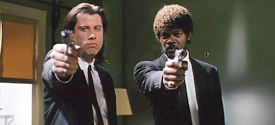
John Travolta (left) and Samuel L. Jackson star as a pair of
[Ed. Note: To celebrate The Diamondback kicking off its 100th year of publication, we will look back at Diversions’ first opinion of one of history’s most iconic films, Pulp Fiction. This review originally ran Oct. 18, 1994.]
Sizzling stories of hit men, drug dealers and crooked boxers twist and turn before the audience’s eyes in Pulp Fiction, the phenomenal new film from Quentin Tarantino. Writer/director Tarantino brings his characters to life with such force and raw energy that they leap off the screen.
The film doesn’t glamorize these criminals; rather, it sneaks into their daily lives. Jumping anachronistically from story to story, we watch them eat and listen to them talk to each other as they go about their daily routine.
Pulp Fiction is filled, top to bottom, with engaging characters. Vince and Jules (John Travolta and Samuel L. Jackson) are two hit men who are much more interested in their conversations than whacking their marks. They discuss everything from the hash bars in Amsterdam to the cleanliness of dogs as compared to pigs to foreign names for Quarter Pounders (which in France is La Royale).
Butch (Bruce Willis) is an over-the-hill boxer who is supposed to throw a fight but doesn’t. He tries to skip town before the mob boss, Wallace (Ving Rhames), finds him.
However, his girlfriend forgets to pack his gold watch, so he goes back for it. (The story of the gold watch is told by Christopher Walken in a hysterical flashback.) Butch gets his watch, but on the way back he bumps into Wallace, and the menacing crime boss chases him into a store. The two struggle but the store owner pulls a gun, stopping their fight. He and his friend tie up Butch and Wallace and bring out a third man dressed in leather from head to toe. I won’t reveal what happens, but if you saw Deliverance, this scene will look familiar.
Elsewhere, Vince has to entertain Wallace’s wife, Mia (Uma Thurman), for an evening while Wallace is out of town. The two go to Jack Rabbit Slim’s, a ’50s dance club with Ed Sullivan as the emcee and Buddy Holly as their waiter. Watching Mia attempt to seduce Vince as he tries to fend off her advances is like watching two swordsmen duel. Both are very high on drugs and their conversation is hilarious.
Tim Roth and Amanda Plummer are amusing as two small-time thieves who get in over their heads when they try to rob a diner instead of the usual liquor store. Other characters include Lance (Eric Stoltz), a paranoid drug dealer who rushes around with a medical book trying to help Vince revive Mia, who has overdosed on Vince’s heroin. Lance’s wife (Rosanna Arquette), whose body is pierced in 18 different places, looks on with stoned indifference.
Pulp Fiction resonates with brilliance. The dialogue is fresh and powerful. Tarantino plays with time by jumping back and forth between stories without regard to any chronology. The result is unique and adds zip to the already electrifying narrative. The film’s over-the-top style is typical of Tarantino. His previous films, Reservoir Dogs and True Romance, were also filled with copious amounts of violence and bravado. But in all three films, the characters are rendered so realistically, so passionately, one can’t help but sympathize with them.
Tarantino is an extremely gifted director who brings out fabulous performances from his actors, especially Travolta and Jackson.
Travolta, back from film obscurity, gives Vince a multi-dimensional persona. At times he is tough, at other times he is funny and vulnerable. We even get to see him dance in a twist contest with Thurman. Jackson creates a hit man who’s part killer, part preacher. Throughout the film, passion and vitality radiate from his dark, gleaming eyes.
Tarantino really packs his film with punch. Every sequence, every shot is memorable. This is a film one can see over and over again. If there were any lingering doubts that Tarantino is the reigning king of “bad boy” films, Pulp Fiction blows them away.
diversions@umdbk.com



